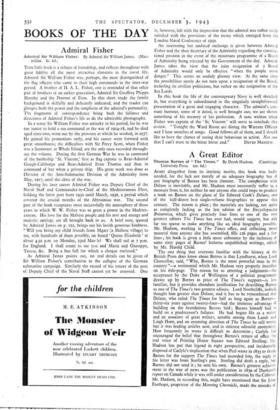BOOKS OF THE DAY
Admiral Fisher
Admiral Sir William Fisher. By Admiral Sir William James. (Mac- millan. 8s. 6d.) Tins little book is a tribute of friendship, and reflects throughout with great fidelity all the most attractive elements in the naval life. Admiral Sir William Fisher was, perhaps, the most distinguished of the flag officers who came to their high commands in the inter-war period. A brother of H. A. L. Fisher, one is reminded of that other pair of brothers of an earlier generation, Admiral Sir Geoffrey Phipps Hornby and the Provost of Eton. In this short study -the family background is skilfully and delicately indicated, and the reader can glimpse both the power and the simplicity of the admiral's personality. The fragments of correspondence bring back the fullness and directness of Admiral Fisher's life as do the admirable photographs.
In a sense Sir William Fisher was unlucky in his period, for he was too junior to hold a sea command in the war of 1914-18, and he died aged sixty-two, worn out by the pressure at which he worked, in 1937. He gained his promotions early, and his career went forward with great smoothness; the difficulties with Sir Percy Scott, when Fisher was a lieutenant at Whale Island, are the only ones recorded through- out the volume. During the first German War he was in command of the battleship St. Vincent,' first as flag captain to Rear-Admiral Gough-Calthorpe and Rear-Admiral Evan Thomas and then in command of her when a private ship. His great work was done as Director of the Anti-Submarine Division of the Admiralty from May, 1917, until the close of the war.
During his later career Admiral Fisher was Deputy Chief of the Naval Staff and Commander-in-Chief of the Mediterranean Fleet, holding the latter post from 1932 until March, 1936, a period which covered the crucial months of the Abyssinian war. The second part of the book recaptures most successfully the atmosphere of those years in which W. W. Fisher was so great a power in the Mediter- ranean. His love for the Maltese people and his zest and energy and majestic carriage are all brought back to us. A brief note, quoted by Admiral James on p. 122, brings out his lavish generous kindness. " Will you bring my child friends from Mgarr (a Maltese village) to tea, with hundreds of them possibly, on board ' Queen Elizabeth' at about 4.50 p.m. on Monday, 23rd Marrh? We shall sail at 7 p.m. for England. I shall count to see you and Maria and Giuseppe, Teresa, &c. Bring a bus full for which a cheque enclosed."
As Admiral James points out, no real details can be given of Sir William Fisher's contribution to the collapse of the German submarine campaign. Similarly the record of his tenure of the post of Deputy Chief of the Naval Staff cannot yet be assessed. One is, however, left with the impression that the admiral was rather easily satisfied with the provisions of the treaty whicli emerged from the London Naval Conference of 1930.
An interesting but undated exchange is given between Admiral Fisher and the then Secretary of the Admiralty regarding the constitu- tional position in the event of the minimum programme of a Board of Admiralty being rejected by the Government of the day. • Admiral James takes the view that the joint resignation of a Board of Admiralty would only be effective " when the people sense danger." This seems an unduly gloomy view. At the same time the possibilities surely do not turn upon a resignation of the Board, including its civilian politicians, but rather on the resignation of the Sea Lords.
In this book the life of the contemporary Navy is well sketched in, but everything is subordinated to the singularly straightforward presentation of a great and engaging character. The admiral's con- stant humour, some of it dated, is well brought out; we are shown something of his mastery of his profession. A note written when
Fisher was captain of the ' St. Vincent' will serve to conclude this review. " Tonight the Ward Room are dining the Warrant Officers and I hear snatches of songs. Good fellows all of them, and I should like to have the chance of seeing their behaviour in action. Not one that I can't trust to the bitter bitter end." DAVID MATHEW.


























 Previous page
Previous page